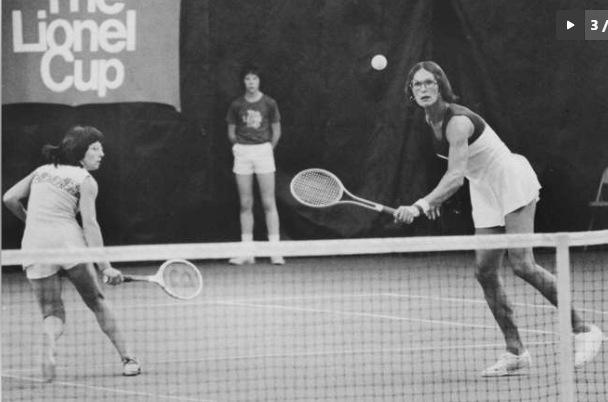Renée Richards’ name is synonymous with groundbreaking change in sports. In the 1970s, she became a trailblazer for transgender athletes, challenging societal norms and breaking barriers in a way that has left a lasting impact on sports today. Her courage and determination paved the way for future generations of transgender athletes to pursue their dreams in professional sports.

A Groundbreaking Journey
Born Richard Raskind in 1934, Richards was a talented tennis player in her youth, excelling in the men’s circuit. However, it wasn’t until her gender transition in 1975 that she truly found herself—both personally and professionally. After her transition, Richards sought to continue playing tennis, this time competing in the women’s category. This decision sparked widespread controversy and put her in the spotlight of a heated debate around gender identity in sports.
In 1976, when Richards entered a women’s tournament, she faced immediate backlash. The United States Tennis Association (USTA) barred her from competing in the U.S. Open unless she passed a chromosome test to prove her gender. Richards refused and instead took the case to court, determined to fight for her right to compete as a woman.

The Legal Battle That Changed Sports
Richards’ legal battle became a landmark case for transgender athletes. In 1977, the New York Supreme Court ruled in her favor, stating that requiring chromosome testing was discriminatory. This victory allowed her to compete in professional women’s tennis, and Richards went on to play in the U.S. Open and other major tournaments, making history as one of the first openly transgender athletes to compete at an elite level.
Her presence on the women’s tour wasn’t without its challenges. Richards faced scrutiny from the media, fellow players, and fans, but she remained focused on her game. In 1979, she reached the doubles final at the U.S. Open and consistently ranked among the top female players. More importantly, her success on the court and in the courtroom opened the door for future conversations about inclusivity in sports.
A Legacy of Courage and Change
Renée Richards’ impact goes far beyond her tennis career. She sparked a conversation about gender identity in sports that continues today, as the world of athletics grapples with the inclusion of transgender athletes across various disciplines. Her courage in standing up for her rights set a precedent that would inspire future athletes to push for equality and fair treatment.
Richards retired from professional tennis in 1981 and later became a renowned ophthalmologist. Her autobiography, Second Serve, published in 1983, gave insight into her journey, struggles, and triumphs as a transgender athlete. She has since remained a vocal advocate for transgender rights and continues to inspire athletes of all genders and identities.

Paving the Way for the Future
Richards’ groundbreaking fight for inclusion in tennis paved the way for today’s transgender athletes who continue to face challenges in sports. Her story resonates even more in the current climate, as the debate surrounding transgender participation in athletics remains a contentious issue. Organizations and sports governing bodies are still working to balance inclusivity with fairness in competition, and Richards’ legacy serves as a reminder of the importance of fighting for one’s right to participate in the sport they love.
Athletes like Renée Richards have made it possible for the next generation to dream bigger and break through societal barriers. Her courage, resilience, and trailblazing journey have left an indelible mark on the sports world, ensuring that the conversation around transgender athletes remains part of the broader dialogue about inclusivity and equality in sports.
Conclusion
Renée Richards’ story is one of perseverance, triumph, and breaking boundaries. Her fight for acceptance and her success on the tennis court helped shape the narrative for transgender athletes today. As we continue to push for progress in sports, Richards’ legacy stands as a beacon of hope and inspiration, reminding us that everyone deserves the chance to compete and succeed, regardless of gender identity.











